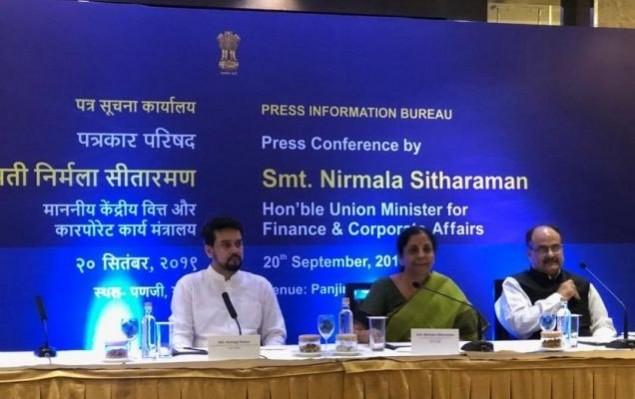
September 20, 2019, will be remembered for the announcement of one of the most impactful reforms. After being on the defensive for lack of a fiscal stimulus, the government has announced a number of measures to boost the economy but all of them pale in comparison to the large cut in corporate tax rate announced today. The Finance Minister Nirmala Sitharaman exhibited boldness while announcing the decisions and instead of being nervous about the revenue shortfalls, she conveyed a clear message that growth is now the topmost priority.
The Minister announced a cut in the corporate tax to 25.17 per cent inclusive of all cess and surcharges for the domestic companies from the current 35 per cent. For new companies in manufacturing, the tax rate will be 17.01 per cent inclusive of all cess and surcharges for firms incorporated after October 1st 2019. Similarly, MAT or Minimum Alternate Tax has been lowered by 3.5 per cent. This measure will be implemented through an ordinance.
The government is expected to forego revenue of Rs 1.45 lakh crore or 0.7 per cent of the estimated GDP of FY2019-20. This does raise fiscal concerns for the current year, and indeed the yield on the 10-year bond has moved up by 16 basis points. While this is a worry for the current year, once growth revives, the impact of higher tax collections and a resultant boost to the economy can overcome the impact of the lower tax rate. Indeed according to the Laffer curve, corporate tax rates in India were sub-optimal and cutting tax rates will stimulate both economic incentives and increase tax revenue.
I believe that the path to fiscal consolidation has been pushed ahead by about a year. On the flip side, if the government had failed to boost growth, then tax collections may have suffered more in the coming years. All in all, I believe that the expected growth will provide the best impetus for fiscal consolidation in the medium to long term.
The immediate impact will be to boost sentiment among the corporate world which is low right now. The move can unleash the animal spirits. This can help in reviving the CAPEX cycle which has suffered in the last two quarters. Also, this will help in improving the financial health of companies.

Companies now have two choices, first, they can retain tax benefits or secondly, they can reduce the price of their goods and services, increasing consumption. Companies in stressed sectors are likely to pass on the benefits to boost demand, especially where the demand elasticity is high. This will especially be the case for consumer goods, autos and real estate. Indirectly this should benefit sectors like cement, steel, capital goods and banks. I estimate that this measure can boost the net profit of listed companies by approximately 5 per cent in FY 2019-20. This move will also help in lowering the cost of capital for companies.
It is important to remember that corporate tax rates in India are not only high although higher than countries that compete with India for export markets and FDI. The new rates are competitive with the rest of the region. Korea, China and Indonesia have a 25 per cent tax rate while Malaysia has a rate of 24 per cent. Trade wars between China and the US have opened up an opportunity for other nations and India is a leading contender along with countries like Vietnam and Indonesia where the tax rate is 20 per cent and 25 per cent, respectively.
The tax rate of 17 per cent for new manufacturing companies compares favourably with Singapore (17 per cent) and Hong Kong (16.5 per cent). This can provide a significant boost for manufacturing and for the Government to give impetus to the "Make in India" initiative. This will act as a double-edged sword stimulating the GDP and also generate fresh employment, both of which are of current concerns of the Government. This move comes just days before the PM's visit to the US which is likely to result in a few commitments.
Among the other measures, the government has withdrawn the enhanced surcharge introduced in the budget which was applicable on capital gains arising from the sale of equity shares in a company which were liable to pay Securities Transaction Tax. This will encourage more participation of Retail, HNIs and institutions in capital markets.
Moving forward, the Minister also said that listed companies that had announced a buyback prior to July 5th will be exempted from the buyback tax. Companies like Infosys and Wipro that had announced a buyback prior to the budget day will be major beneficiaries. Reduction in personal tax rate is also on the cards and if this happens then it will increase consumer spending.
After three weeks of pro-growth announcements made to boost the liquidity situation, reviving exports and creating employment opportunities, the government, at last, spotted the right path and came out with aforesaid measures. To be sure, in order for Indian companies to compete in the export markets, and in order to attract FDI in manufacturing, more reforms will be needed. In brief, progress is needed in land & labour reforms, investment in infrastructure and cutting red tape.
After having focused on prudence in its first term, it is clear that the intent of the government is on boosting growth. Coming ahead of the festive season, it can help boost consumption which in turn will revive the animal spirits. I also expect the government to announce more measures in the coming days. The focus should be on reviving growth and apart from the initiatives in progress, the priority should be to increase infrastructure spending and improving the health of the financial sector.

















